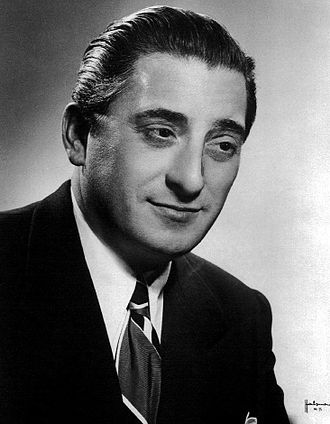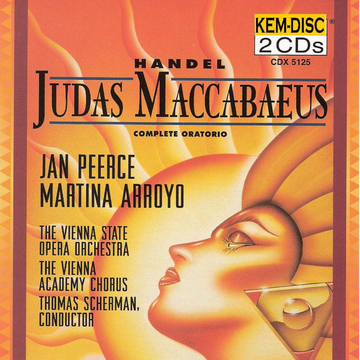
Peerce, Jan
Jan Peerce (born Jacob Pincus Perelmuth; June 3, 1904 – December 15, 1984) was an American operatic tenor. Peerce was an accomplished performer on the operatic and Broadway concert stages, in solo recitals, and as a recording artist. He is the father of film director Larry Peerce.[1]
Jan Peerce was born Jacob Pincus Perelmuth[2] to a Jewish family.[3] His parents, Louis and Henya Perelmuth, came from the village of Horodetz, formerly in Poland, now Belarus.[4] Their first child, a daughter, died in an epidemic. In 1903 they emigrated to America along with their second child, a boy named Mottel. A year later, on June 3, 1904, their third child, Jacob Pincus, was born in a cold water flat in the Lower East Side, Manhattan, New York. He was nicknamed “Pinky” by his neighborhood friends. When he was three years old, his older brother Mottel was killed in an accident as he hitched a ride on an ice wagon.[4] Jan remained on the Lower East Side until his 1930 marriage to Alice Kalmanovitz (1907-1994), a childhood friend. He attended DeWitt Clinton High School and Columbia University. At his mother’s urging he took violin lessons,[4] and gave public performances, including dance band work as Jack “Pinky” Pearl. Sometimes he also sang and it was soon discovered he was an exceptional lyric tenor.
Peerce was the brother-in-law of fellow American tenor Richard Tucker. He died at his home in New Rochelle, New York on December 15, 1984 at the age of 80.[5][6] Peerce is interred at Mount Eden Cemetery in Valhalla, Westchester County.
Peerce studied singing in New York City with Giuseppe Boghetti. In 1932 he was hired as a tenor soloist with the Radio City Music Hall company by the impresario Roxy, who renamed him John Pierce. They soon compromised on the spelling Jan Peerce, which the singer felt better reflected his ethnicity. Thanks to radio broadcasts and stage programs, Peerce soon had a nationwide following. The legendary maestro Arturo Toscanini heard him singing Wagner on the radio and was able to contact Peerce through a mutual friend to see if he would like to audition for him. Toscanini found him to be the tenor he had sought to sing operatic and choral works with the NBC Symphony Orchestra. The recordings made during, or following, the NBC broadcasts are among the outstanding musical legacies of the mid-20th century. Toscanini was reportedly pleased with Peerce’s professionalism, as well as his musical talents and his unusually native-sounding Italian; many have said that Peerce was Toscanini’s “favorite tenor” during the Maestro’s 17 years at NBC. Peerce recalled that Toscanini never lost his temper the way he famously did with other musicians even though Peerce believed he had the right to, on a few occasions. Peerce first sang with Toscanini on February 6, 1938, in Carnegie Hall in a broadcast performance of Beethoven‘s Ninth Symphony; the soloists also included soprano Vina Bovy, mezzo-soprano Kerstin Thorborg, and bass Ezio Pinza.[7]
Peerce joined the roster of principal tenors at the Philadelphia La Scala Opera Company (PLSOC) in 1938. He made his professional opera debut with the company on December 10 of that year as the Duke of Mantua in Verdi‘s Rigoletto with Robert Weede in the title role and Fritz Mahler conducting. He also sang Alfredo in La traviata with Annunciata Garrotto as Violetta and Weede as Germont during the company’s 1938-1939 season. Peerce sang in several more performance with the PLSOC through 1941, singing Pinkerton in Puccini‘s Madama Butterfly with Elda Ercole as Cio-Cio-San, and reprising the roles of the Duke and Alfredo a number of times.
In November 1939 Peerce performed his first solo recital in New York City. He made his debut with the Metropolitan Opera on November 29, 1941, singing Alfredo in Verdi’s La traviata. He sang also the parts of Cavaradossi in Puccini’s Tosca, Rodolfo in La bohème, and in Gounod‘s Faust. He was hailed by critics as the “All-American successor to the ‘greats’ of opera’s almost extinct ‘Golden Age’.”[citation needed]
In 1943 he appeared in the OWI film, Hymn of the Nations, with Toscanini, the NBC Symphony Orchestra, and the Westminster Choir in a performance of Verdi’s then seldom-heard choral work. Filmed in NBC Studio 8-H, the performance has been issued on video-cassette and DVD.During the 1950s Peerce performed regularly as a featured soloist before audiences of over 14,000 guests under the conductor Alfredo Antonini at the Lewisohn Stadium in New York City. These Italian Night open-air concerts featured the New York Philharmonic and the Lewisohn Stadium Orchestra along with such operatic luminaries as Richard Tucker, Robert Merrill, and Eileen Farrell.Also in 1952, Jan Peerce toured South America with a company called “Stars of the Metropolitan Opera”. This tour featured June Preston, a former child film star, who at the age of 24, debuted as Mimì in La bohème opposite Peerce as Rodolfo.In 1956 Peerce made a sensation in Moscow as a musical “cultural exchange” ambassador, being the first American to sing with the famed Bolshoi Opera. He remained on the roster of the Metropolitan until 1966, appearing again in 1966-1967. He also taught a master class. In 1971 he made his Broadway debut as Tevye in Fiddler on the Roof.
He continued to make occasional appearances until his retirement in 1982, remaining in fine voice. His last concert was on May 2, 1982, as the guest artist with the Beth Abraham Youth Chorale in Dayton, Ohio.[19]

